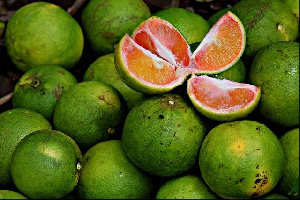Trade partners, mainly from Europe, are demanding more and more dried orange and lemon peel from the country.
The increasing demand from EU countries such as Germany and Netherlands, among others, is seen as a boost to the export of non-traditional products.
“The dried lemon and orange peels are mainly used as infusions in the production of things like tea. Now, using citrus peels as infusions for tea is in vogue and Ghana must take advantage of it to boost our foreign exchange earnings,” Mr. Samuel Nii Quarcoo, an agronomist and Chief Executive Officer of Quin Organics, told the B&FT.
Mr. Quarcoo, whose company produces fresh lemon, pineapple and orange juices, said: “We have orders from Germany to supply large amounts of citrus peel and there are other suppliers with orders too,” he said.
A sack of dried certified orange peel weighs about 12 kilos while that of lemon weighs about 16 kilos. It is sold by Ghanaian suppliers to their European clients for an average €2 per kilo.
The peel, mainly the by-product generated from fresh-fruit producing companies in the country, are first dried and passed through all quality control checks before being bagged in sacks. They are then packed into 20-foot and 40-foot metal containers, depending on the quantity demanded by the importer.
Major lemon peel buyer countries include the United States, United Kingdom, France and New Zealand.
This shows the potential export revenue to be generated from the export of citrus peels if the trade is encouraged as part of the country’s non-traditional exports.
Ghana’s earnings from non-traditional exports rose by a meagre 3.1 percent in 2013, after posting a marginal decline in 2012.
Earnings amounted to US$2.44billion from the previous year’s figure of US$2.36billion, and the share of non-traditional exports -- that is, exports aside from gold, cocoa, oil and timber -- fell to 17.2 percent from 17.5 percent in 2012.
Earnings from non-traditional exports were driven by three main sub-sectors: agriculture, processed and semi-processed foods, and handicrafts. Processed and semi-processed foods topped the sub-sectors with US$2.1billion, followed by agriculture with US$306million, and handicrafts with US$2.46million.
Mr. Quarcoo believes that signing the Economic Partnership Agreements with the EU will protect the country’s current export levels to the EU.
“Our current exports to the EU are relatively low. We need to sign the EPAs to protect our current export level to the EU and improve upon it,” he said.
Under the EPAs, the EU is offering ECOWAS nations including Ghana the opportunity to retain privileged access to its market through duty-free and quota-free exports. The bloc has also said that failure to reach agreement on the protracted trade deal will cause tariffs to be raised on West Africa’s exports into the EU.
Government is aiming to generate US$5billion from the export of non-traditional products by 2017.
Business News of Tuesday, 10 June 2014
Source: B&FT

















